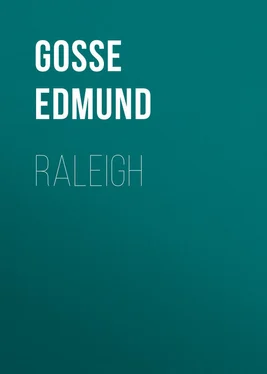Edmund Gosse - Raleigh
Здесь есть возможность читать онлайн «Edmund Gosse - Raleigh» — ознакомительный отрывок электронной книги совершенно бесплатно, а после прочтения отрывка купить полную версию. В некоторых случаях можно слушать аудио, скачать через торрент в формате fb2 и присутствует краткое содержание. Жанр: foreign_antique, foreign_prose, на английском языке. Описание произведения, (предисловие) а так же отзывы посетителей доступны на портале библиотеки ЛибКат.
- Название:Raleigh
- Автор:
- Жанр:
- Год:неизвестен
- ISBN:нет данных
- Рейтинг книги:3 / 5. Голосов: 1
-
Избранное:Добавить в избранное
- Отзывы:
-
Ваша оценка:
- 60
- 1
- 2
- 3
- 4
- 5
Raleigh: краткое содержание, описание и аннотация
Предлагаем к чтению аннотацию, описание, краткое содержание или предисловие (зависит от того, что написал сам автор книги «Raleigh»). Если вы не нашли необходимую информацию о книге — напишите в комментариях, мы постараемся отыскать её.
Raleigh — читать онлайн ознакомительный отрывок
Ниже представлен текст книги, разбитый по страницам. Система сохранения места последней прочитанной страницы, позволяет с удобством читать онлайн бесплатно книгу «Raleigh», без необходимости каждый раз заново искать на чём Вы остановились. Поставьте закладку, и сможете в любой момент перейти на страницу, на которой закончили чтение.
Интервал:
Закладка:
While Raleigh was shaking down a fortune from the green ivy-bushes that hung at the vintners' doors, the western continent, at which he had already cast wistful glances, remained the treasure-house of Spain. His unfortunate but indomitable half-brother, Sir Humphrey Gilbert, recalled it to his memory. The name of Gilbert deserves to be better remembered than it is; and America, at least, will one day be constrained to honour the memory of the man who was the first to dream of colonising her shores. Until his time, the ambition of Englishmen in the west had been confined to an angry claim to contest the wealth and beauty of the New World with the Spaniard. The fabulous mines of Cusco, the plate-ships of Lima and Guayaquil, the pearl-fisheries of Panama, these had been hitherto the loadstar of English enterprise. The hope was that such feats as those of Drake would bring about a time when, as George Wither put it,
the spacious West,
Being still more with English blood possessed,
The proud Iberians shall not rule those seas,
To check our ships from sailing where they please.
Even Frobisher had not entertained the notion of leaving Spain alone, and of planting in the northern hemisphere colonies of English race. It was Sir Humphrey Gilbert who first thought of a settlement in North America, and the honour of priority is due to him, although he failed.
His royal charter was dated June 1578, and covered a space of six years with its privilege. We have already seen that various enterprises undertaken by Gilbert in consequence of it had failed in one way or another. After the disaster of 1579 he desisted, and lent three of his remaining vessels to the Government, to serve on the coast of Ireland. As late as July 1582 the rent due to him on these vessels was unpaid, and he wrote a dignified appeal to Walsingham for the money in arrears. He was only forty-three, but his troubles had made an old man of him, and he pleads his white hairs, blanched in long service of her Majesty, as a reason why the means of continuing to serve her should not be withheld from him. Raleigh had warmly recommended his brother before he was himself in power, and he now used all his influence in his favour. It is plain that Gilbert's application was promptly attended to, for we find him presently in a position to pursue the colonising enterprises which lay so near to his heart. The Queen, however, could not be induced to encourage him; she shrewdly remarked that Gilbert 'had no good luck at sea,' which was pathetically true. However, Gilbert's six years' charter was about to expire, and his hopes were all bound up in making one more effort. He pleaded, and Raleigh supported him, until Elizabeth finally gave way, merely refusing to allow Raleigh himself to take part in any such 'dangerous sea-fights' as the crossing of the Atlantic might entail.
On June 11, 1583, Sir Humphrey Gilbert sailed from Plymouth with a little fleet of five vessels, bound for North America. According to all authorities, Raleigh had expended a considerable sum in the outfit; according to one writer, Hayes (in Hakluyt), he was owner of the entire expedition. He spent, we know, 2,000 l. in building and fitting out one vessel, which he named after himself, the 'Ark Raleigh.'
Sir Humphrey Gilbert was not born under a fortunate star. Two days after starting, a contagious fever broke out on board the 'Ark Raleigh,' and in a tumult of panic, without explaining her desertion to the admiral, she hastened back in great distress to Plymouth. The rest of the fleet crossed the Atlantic successfully, and Newfoundland was taken in the Queen's name. One ship out of the remaining four had meanwhile been sent back to England with a sick crew. Late in September 1583 a second sailed into Plymouth with the news that the other two had sunk in an Atlantic storm on the 8th or 9th of that month. The last thing known of the gallant admiral before his ship went down was that 'sitting abaft with a book in his hand,' he had called out 'Be of good heart, my friends! We are as near to heaven by sea as by land.'
At the death of Gilbert, his schemes as a colonising navigator passed, as by inheritance, to Raleigh. That he had no intention of letting them drop is shown by the fact that he was careful not to allow Gilbert's original charter to expire. In June 1584 other hands might have seized his brother's relinquished enterprise, and therefore it was, on March 25, that Raleigh moved the Queen to renew the charter in his own name. In company with a younger half-brother, Adrian Gilbert, and with the experienced though unlucky navigator John Davis as a third partner, Raleigh was now incorporated as representing 'The College of the Fellowship for the Discovery of the North West Passage.' In this he was following the precedent of Gilbert, who had made use of the Queen's favourite dream of a northern route to China to cover his less attractive schemes of colonisation. Raleigh, however, took care to secure himself a charter which gave him the fullest possible power to 'inhabit or retain, build or fortify, at the discretion of the said W. Raleigh,' in any remote lands that he might find hitherto unoccupied by any Christian power. Armed with this extensive grant, Raleigh began to make his preparations.
It is needful here to pass rapidly over the chronicle of the expeditions to America, since they form no part of the personal history of Raleigh. On April 27 he sent out his first fleet under Amidas and Barlow. They sailed blindly for the western continent, but were guided at last by 'a delicate sweet smell' far out in ocean to the coast of Florida. They then sailed north, and finally landed on the islands of Wokoken and Roanoke, which, with the adjoining mainland, they annexed in the name of her Majesty. In September this first expedition returned, bringing Raleigh, as a token of the wealth of the new lands, 'a string of pearls as large as great peas.' In honour of 'the eternal Maiden Queen,' the new country received the name of Virginia, and Raleigh ordered his own arms to be cut anew, with this legend, Propria insignia Walteri Ralegh, militis, Domini et Gubernatoris Virginiæ . No attempt had been made on this occasion to colonise. It was early in the following year that Raleigh sent out his second Virginian expedition, under the brave Sir Richard Grenville, to settle in the country. The experiment was not completely successful at first, but from August 17, 1585, which is the birthday of the American people, to June 18, 1586, one hundred and eight persons under the command of Ralph Lane, and in the service of Raleigh, made Roanoke their habitation. It is true that the colonists lost courage and abandoned Virginia at the latter date, but an essay at least had been made to justify the sanguine hopes of Raleigh.
These expeditions to North America were very costly, and by their very nature unremunerative for the present. Raleigh, however, was by this time quite wealthy enough to support the expense, and on the second occasion accident befriended him. Sir Richard Grenville, in the 'Tiger,' fell in with a Spanish plate-ship on his return-voyage, and towed into Plymouth Harbour a prize which was estimated at the value of 50,000 l. But Raleigh was, indeed, at this time a veritable Danaë. As though enough gold had not yet been showered upon him, the Queen presented to him, on March 25, 1584, a grant of license to export woollen broad-cloths, a privilege the excessive profits of which soon attracted the critical notice of Burghley. Raleigh's grant, however, was long left unassailed, and was renewed year by year at least until May 1589. It would seem that his income from the trade in undyed broad-cloth was of a two-fold nature, a fixed duty on exportation in general, and a charge on 'over-lengths,' that is to say, on pieces which exceeded the maximum length of twenty-four yards. When Burghley assailed this whole system of taxation in 1591, he stated that Raleigh had, in the first year only of his grant, received 3,950 l. from a privilege for which he paid to the State a rent of only 700 l. If this was correct, and no one could be in a better position than Burghley to check the figures, Raleigh's income from broad-cloth alone was something like 18,000 l. of Victorian money.
Читать дальшеИнтервал:
Закладка:
Похожие книги на «Raleigh»
Представляем Вашему вниманию похожие книги на «Raleigh» списком для выбора. Мы отобрали схожую по названию и смыслу литературу в надежде предоставить читателям больше вариантов отыскать новые, интересные, ещё непрочитанные произведения.
Обсуждение, отзывы о книге «Raleigh» и просто собственные мнения читателей. Оставьте ваши комментарии, напишите, что Вы думаете о произведении, его смысле или главных героях. Укажите что конкретно понравилось, а что нет, и почему Вы так считаете.












